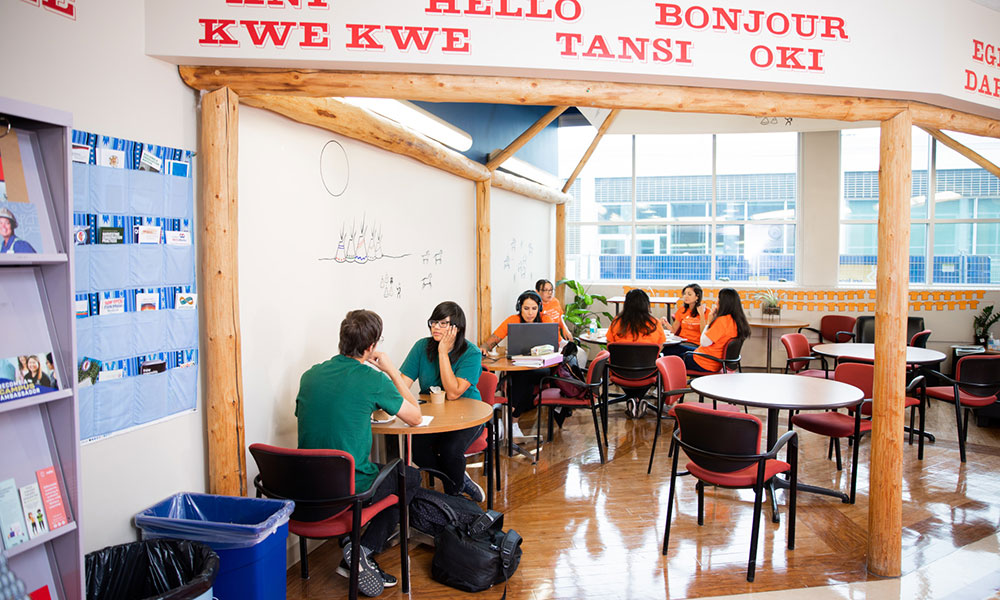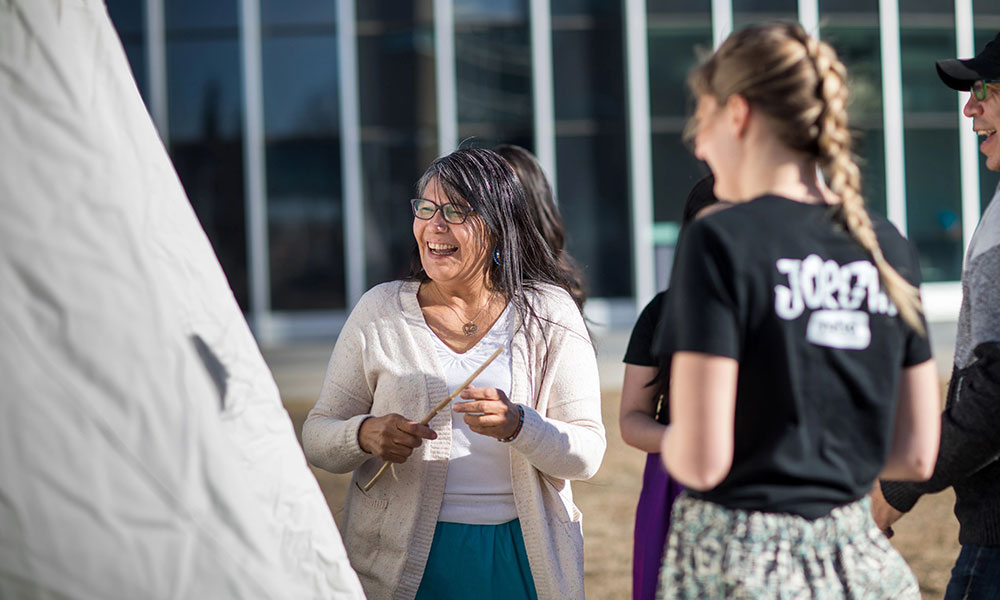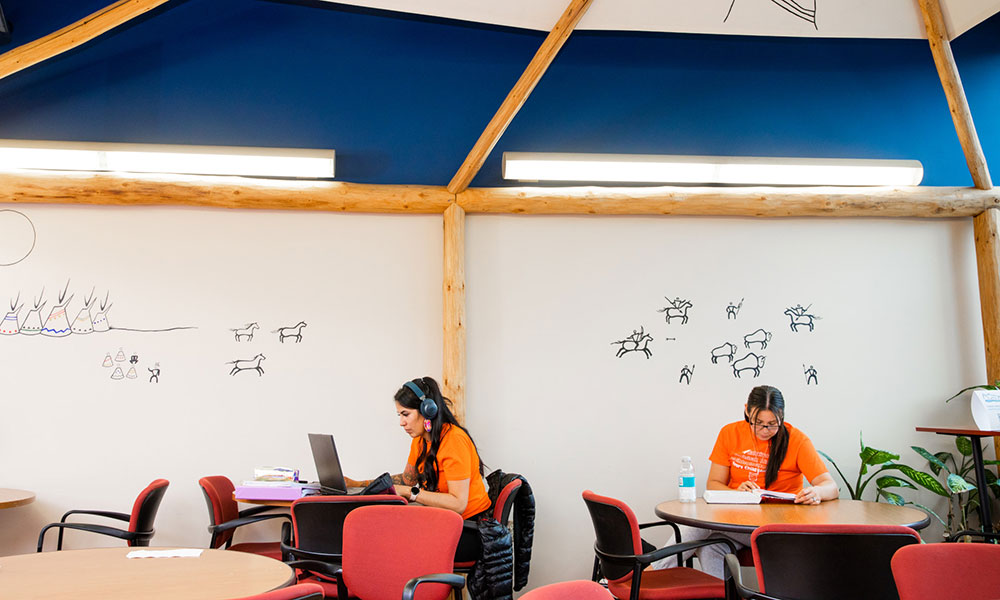Sharing lived experience to aid student success
I've often felt a sense of refuge at the Nîsôhkamâtotân Centre, NAIT’s gathering place for Aboriginal and non-Aboriginal people to meet, study and share their post-secondary learning experiences.
Coming in from the stream of students and staff in the hallway can be like making it to the sidewalk after crossing a busy street; you can take a breath, get your bearings, pick the best direction to take. Inside, there’s a small collection of tables and chairs, people studying in natural light from windows overlooking a courtyard, and a calming atmosphere. Time spent here is a welcome pause.
And, for some, it’s a point of connection. For nearly two decades, Nîsôhkamâtotân Centre has offered not just study and meeting space, but opportunities for learning traditional teachings and participating in cultural events. It has also been a place to gain insight from Elders and other members of the Indigenous community.
Verna Orr, of Bigstone Cree Nation, has served as the centre’s Elder since 2015. Lonny Potts, of the Paul Band, joined in September as cultural adviser (funded for a one-year term by TC Energy). By visiting campus twice a month, they fulfill essential roles in NAIT’s efforts at true inclusion.
“We're bear-greasing the wheels and the cogs of the institution,” says Potts with a laugh.
We talked with him, Orr and Nîsôhkamâtotân Centre manager Derek Thunder about what that means to creating a unique space where students can engage with and reflect upon their personal and educational journeys at NAIT.
Learn more about support and events available through the Nîsôhkamâtotân Centre
Culture and education

Verna Orr: I want to support the students, and offer guidance. Try and help the young people understand our way of life. You need both: their education and our way is very important.
I teach beading, how to make moccasins. We do talking circles – women’s circles. Those are like counselling. Healing circles.
Derek Thunder: A lot of women were asking specifically for an opportunity to sit with Verna and have those chats. When we created the women's circle we realized we didn't have a male counterpart to do that for men. So I was given the opportunity to ask Lonny, who comes to us having been taught the traditional teachings and is also a pipe carrier, to support the men.
Lonny Potts: [The post-secondary] setting is non-spiritual. When you're in a competitive environment, things fall to the wayside. And when you come from a place of trauma, you need to emotionally regulate to learn, because your brain will be hijacked by your emotions. So, the important thing, I think, is to help people feel safe, because in these types of settings you still experience discrimination and racism.
Leading by example

Potts: [The way] our ancestors and the Elders that I’ve worked with conducted themselves – with kindness, love and honesty – those are really powerful attributes to model. That's an important thing for Indigenous cultures – to role model.
Thunder: The purpose of why [Verna and Lonny] are here is to be visible. The opportunity is for students to come and see them when they're comfortable, whenever they need to.
Potts: For a long time, not having my culture, I felt like I was lost. And I didn't have identity. When I started learning with the Elders, that's what I got. And, to me, that's truth. When you have truth, you can have faith.
When you want to create community, that's what you need to have: truth that creates faith. For me, my story is truth. The way I had to overcome my own struggles to be where I'm at is similar to a lot of the students. They can relate to that.
Experiences as tools

Orr: The way I see it, [the ancestors] give you tools that you can pick up. You don't have to take all of them; you just take whatever you want to use. And then you [use them to] teach. What I went through in life, and what I see in other people now, it's like I'm reading a book. I was there already. This is what you do. This is the tool for you to use.
Potts: We all, as Indigenous people, experience the same challenges right across Canada. That’s what colonization has done. It's just a matter of how you find your way out of there. Move ahead and move on. I really like Verna’s analogy because it’s like a manual you can refer to.
That’s so important, that lived experience. That’s what part of this role encompasses.
Thunder: That lived experience is what we look for with regards to the environment that we're creating at the Nîsôhkamâtotân Centre.
It's wonderful to see students who come here who are not as confident but then get to a welcoming environment that has humor, connectedness, and the cultural advisers and elders. Then you watch that individual grow. With that confidence, their marks increase. By the time they leave, they've become ambassadors and leaders.
When you see that, that's what I know we’re doing something right at NAIT.
“A good feeling”
Scott Messenger: As an Elder and a cultural adviser, do you draw anything personally from this work?
Orr: Yes, but I don't know how to explain it. It's a blessing when you help people succeed, or help them take the right path. I wouldn't know how to explain it for you. But it is a good feeling.
Potts: It's an honor. The Creator put us here, so when he asks you to do something, you say thank you. That's what I always pray for. "Where do you want me to go next? What do you want me to do?" And I find myself here.